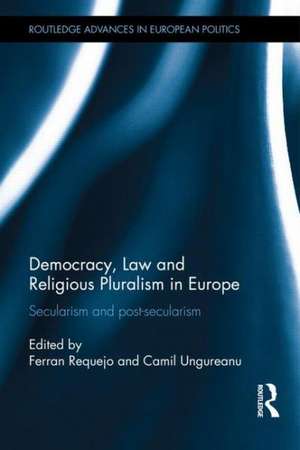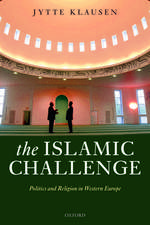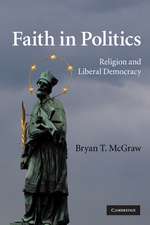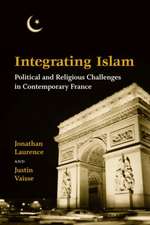Democracy, Law and Religious Pluralism in Europe: Secularism and Post-Secularism: Routledge Advances in European Politics
Editat de Ferran Requejo, Camil Ungureanuen Limba Engleză Hardback – 31 iul 2014
This book focuses on a central question: are the classical secularist arrangements well equipped to tackle the challenge of fast-growing religious pluralism? Or should we move to new post-secular arrangements when dealing with pluralism in Europe? Offering an interdisciplinary approach that combines political theory and legal analysis, the authors tackle two interrelated facets of this controversial question. They begin by exploring the theoretical perspective, asking what post-secularism is and looking at its relation to secularism. The practical consequences of this debate are then examined, focusing on case-law through four empirical case studies.
This book will be of interest to students and scholars of political theory, philosophy, religion and politics, European law, human rights, legal theory and socio-legal studies.
| Toate formatele și edițiile | Preț | Express |
|---|---|---|
| Paperback (1) | 299.52 lei 6-8 săpt. | |
| Taylor & Francis – 11 noi 2016 | 299.52 lei 6-8 săpt. | |
| Hardback (1) | 820.71 lei 6-8 săpt. | |
| Taylor & Francis – 31 iul 2014 | 820.71 lei 6-8 săpt. |
Din seria Routledge Advances in European Politics
-
 Preț: 324.96 lei
Preț: 324.96 lei -
 Preț: 311.41 lei
Preț: 311.41 lei -
 Preț: 324.87 lei
Preț: 324.87 lei -
 Preț: 364.22 lei
Preț: 364.22 lei -
 Preț: 137.51 lei
Preț: 137.51 lei -
 Preț: 285.03 lei
Preț: 285.03 lei - 9%
 Preț: 1037.85 lei
Preț: 1037.85 lei - 18%
 Preț: 1112.03 lei
Preț: 1112.03 lei - 18%
 Preț: 999.64 lei
Preț: 999.64 lei - 18%
 Preț: 1058.79 lei
Preț: 1058.79 lei - 18%
 Preț: 1055.69 lei
Preț: 1055.69 lei -
 Preț: 326.03 lei
Preț: 326.03 lei - 18%
 Preț: 1007.36 lei
Preț: 1007.36 lei - 18%
 Preț: 1060.87 lei
Preț: 1060.87 lei - 18%
 Preț: 1010.60 lei
Preț: 1010.60 lei - 18%
 Preț: 1057.13 lei
Preț: 1057.13 lei - 18%
 Preț: 1057.61 lei
Preț: 1057.61 lei - 18%
 Preț: 1059.93 lei
Preț: 1059.93 lei - 18%
 Preț: 1061.93 lei
Preț: 1061.93 lei - 18%
 Preț: 998.40 lei
Preț: 998.40 lei - 18%
 Preț: 1114.64 lei
Preț: 1114.64 lei - 18%
 Preț: 1058.43 lei
Preț: 1058.43 lei - 18%
 Preț: 1112.03 lei
Preț: 1112.03 lei - 18%
 Preț: 1057.75 lei
Preț: 1057.75 lei - 18%
 Preț: 1055.21 lei
Preț: 1055.21 lei -
 Preț: 370.71 lei
Preț: 370.71 lei - 18%
 Preț: 1050.02 lei
Preț: 1050.02 lei - 18%
 Preț: 1001.55 lei
Preț: 1001.55 lei - 18%
 Preț: 973.89 lei
Preț: 973.89 lei - 25%
 Preț: 828.12 lei
Preț: 828.12 lei -
 Preț: 393.26 lei
Preț: 393.26 lei - 18%
 Preț: 1060.25 lei
Preț: 1060.25 lei - 18%
 Preț: 706.91 lei
Preț: 706.91 lei - 18%
 Preț: 1273.35 lei
Preț: 1273.35 lei -
 Preț: 394.19 lei
Preț: 394.19 lei - 18%
 Preț: 1057.13 lei
Preț: 1057.13 lei - 18%
 Preț: 1059.93 lei
Preț: 1059.93 lei - 18%
 Preț: 1058.79 lei
Preț: 1058.79 lei - 18%
 Preț: 952.31 lei
Preț: 952.31 lei - 18%
 Preț: 1057.75 lei
Preț: 1057.75 lei - 18%
 Preț: 1054.71 lei
Preț: 1054.71 lei - 18%
 Preț: 1059.84 lei
Preț: 1059.84 lei - 28%
 Preț: 823.63 lei
Preț: 823.63 lei - 26%
 Preț: 765.01 lei
Preț: 765.01 lei - 18%
 Preț: 947.36 lei
Preț: 947.36 lei - 18%
 Preț: 1113.95 lei
Preț: 1113.95 lei - 16%
 Preț: 248.97 lei
Preț: 248.97 lei -
 Preț: 352.36 lei
Preț: 352.36 lei - 26%
 Preț: 822.36 lei
Preț: 822.36 lei
Preț: 820.71 lei
Preț vechi: 1103.24 lei
-26% Nou
Puncte Express: 1231
Preț estimativ în valută:
157.04€ • 163.96$ • 129.97£
157.04€ • 163.96$ • 129.97£
Carte tipărită la comandă
Livrare economică 04-18 aprilie
Preluare comenzi: 021 569.72.76
Specificații
ISBN-13: 9780415828338
ISBN-10: 0415828333
Pagini: 252
Dimensiuni: 156 x 234 x 20 mm
Greutate: 0.5 kg
Ediția:New.
Editura: Taylor & Francis
Colecția Routledge
Seria Routledge Advances in European Politics
Locul publicării:Oxford, United Kingdom
ISBN-10: 0415828333
Pagini: 252
Dimensiuni: 156 x 234 x 20 mm
Greutate: 0.5 kg
Ediția:New.
Editura: Taylor & Francis
Colecția Routledge
Seria Routledge Advances in European Politics
Locul publicării:Oxford, United Kingdom
Public țintă
Postgraduate and UndergraduateCuprins
1. Uses and Abuses of Post-secularism. An introduction Camil Ungureanu PART I: Theoretical Approaches. Secularism or post-secularism in Europe? 2. Equal Liberty, Non-Establishment and Religious Freedom Cécile Laborde 3. Religious Pluralism in a Deliberative Democracy Cristina Lafont 4. The Theological and Secular Dimensions of the Modern State: historical and contemporary perspectives John Loughlin 5. Postsecular Awareness and the Depth of Pluralism Paolo Monti 6. Reconciling Diversity and Solidarity? A Critical Look at Charles Taylor’s Conception of Secularism Bernard Gagnon PART II: From Theory to Practice. Religion and the European Court of Human Rights 7. Religious Pluralism: the Case of the European Court of Human Rights Javier Martínez-Torrón 8. A Marriage Made in Heaven? The Relationship between Religious Pluralism and Secularism Lorenzo Zucca 9. Conscientious Objection to Same-Sex Marriage: Politics by other Means Daniel Gamper 10. The Conundrum of Pluralism and the Doctrine of the Margin of Appreciation: the Crucifix affair and the Ambivalence of the ECtHR Marisa Iglesias – Camil Ungureanu 11. Religions and Liberal Democracies. Final Remarks Ferran Requejo
Notă biografică
Ferran Requejo is Professor of Political Science and Director of the Research Group on Political Theory and of the MA programme on Diverse Democracies at the Universitat Pompeu Fabra in Barcelona.
Camil Ungureanu is Lecturer in Political Theory and Director of the MA programme on Political Philosophy at the Universitat Pompeu Fabra in Barcelona.
Camil Ungureanu is Lecturer in Political Theory and Director of the MA programme on Political Philosophy at the Universitat Pompeu Fabra in Barcelona.
Descriere
This book focuses on a central question: are the classical secularist arrangements well-equipped to tackle the challenge of fast-growing religious pluralism? Or should we move to new post-secular arrangements when dealing with pluralism in Europe? Offering an interdisciplinary approach that combines political theory and legal analysis, the authors tackle two interrelated facets of this controversial question. They begin by exploring the theoretical perspective, asking what post-secularism is and looking at its relation to secularism. The practical consequences of this debate are then examined, focusing on case-law through four empirical case studies.















